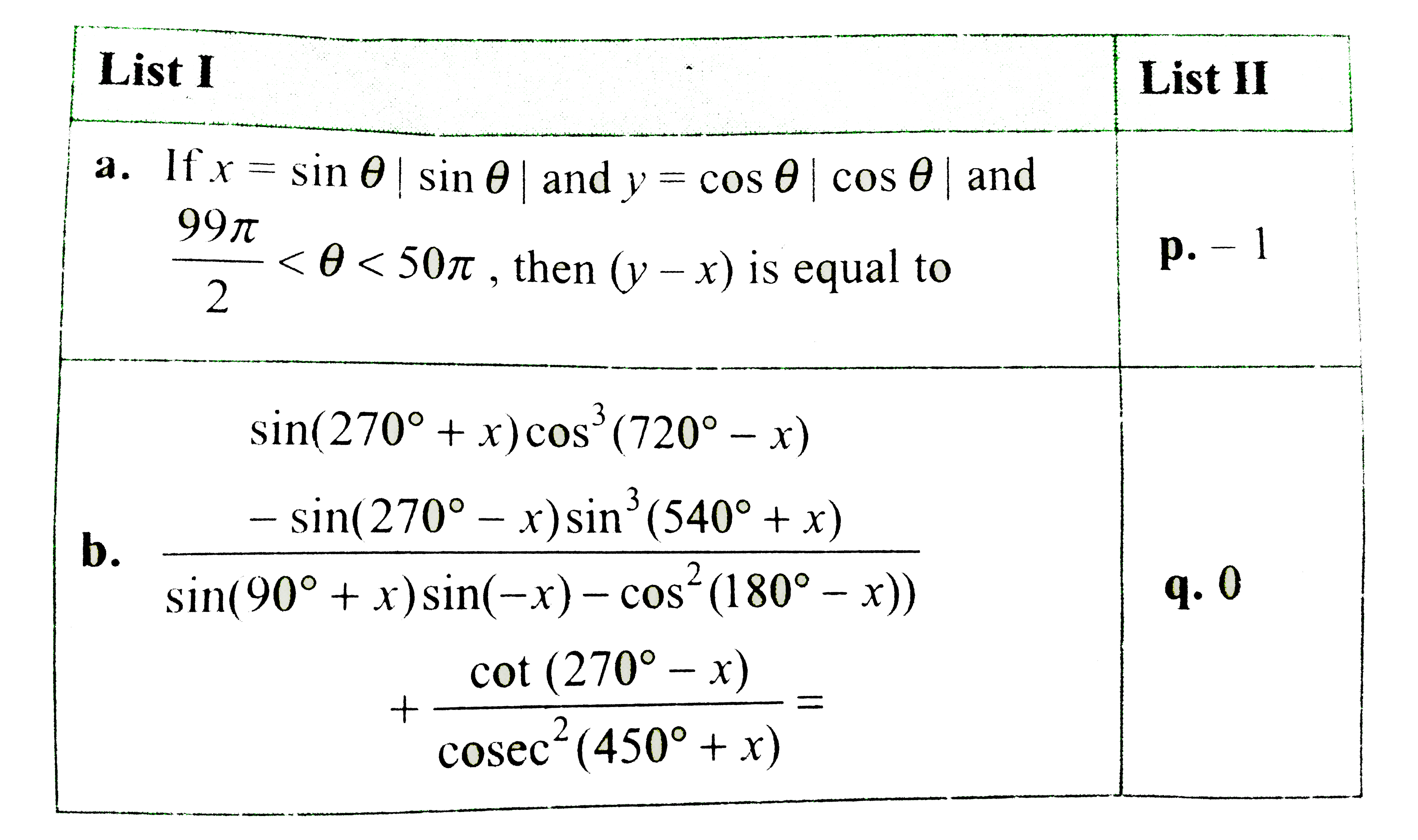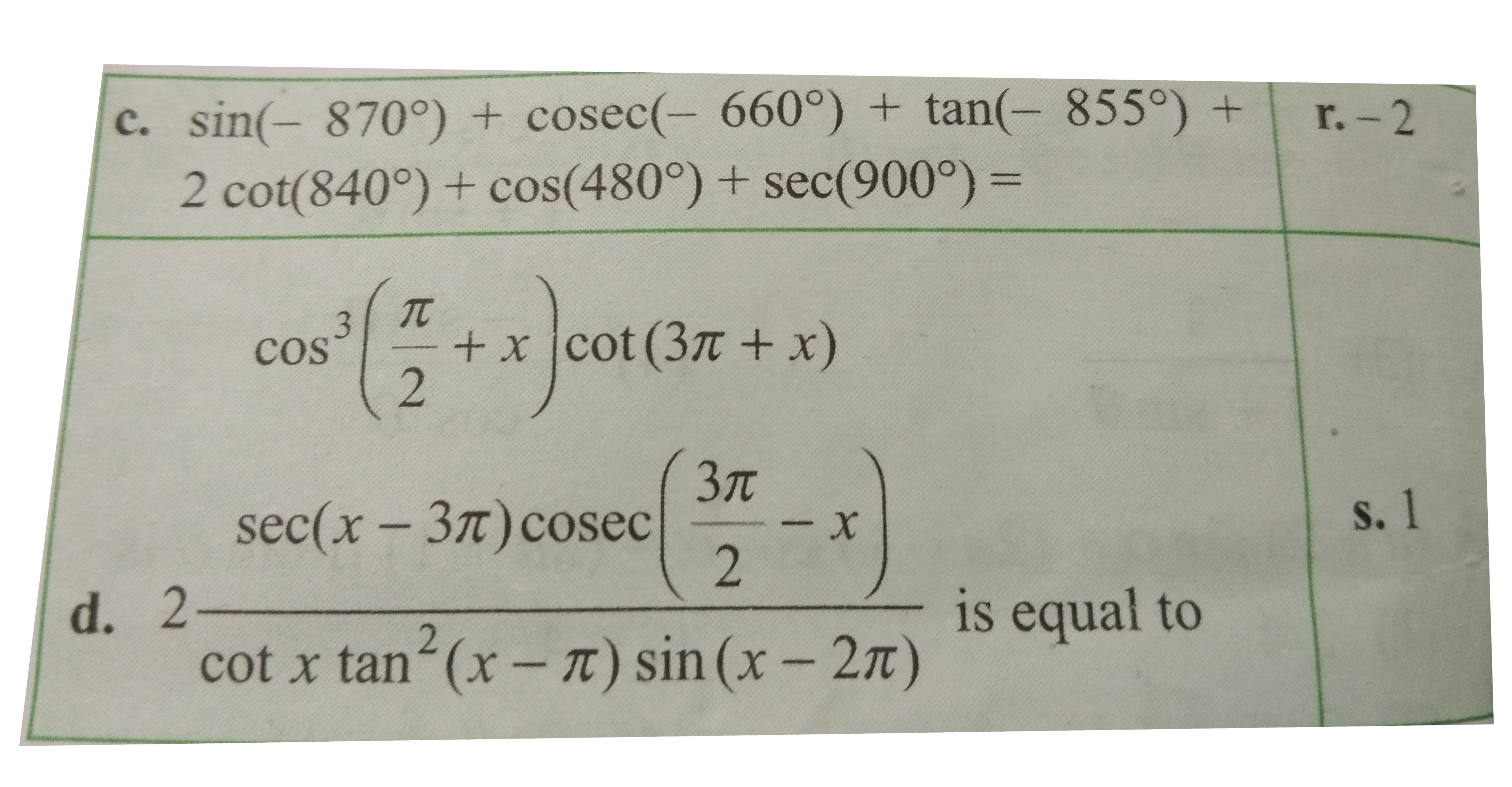For 0<φ≥π2,ifx=∞∑n=0cos2nφ,y=∞∑n=0sin2nφ,then (a)xyz=xz+y (b) xyz=xy+z (c)xyz=x+y+z (d) xyz=yz+xSolution in Bengali
xyz=xz+y
xyz=xy+z
xyz=x+y+z
xyz=yz+x
The correct Answer is:B, C
All are infinte geometric progression with common ratio lt 1
x=11−cos2ϕ=1sin2ϕ,y=11−sin2ϕ=1cos2ϕ,
z=11−cos2ϕsin2ϕ
Now, xy+z=1sin2ϕcos2ϕ+11−sin2ϕcos2ϕ
=1sin2ϕcos2ϕ(1−sin2ϕcos2ϕ)
orxy+z=xyz...(i)
Clearly, x+y=sin2ϕ+cos2ϕsin2ϕcos2ϕ=xy
∴x+y+z=xyz [using Eq. (i)]
Topper's Solved these Questions
- TRIGONOMETRIC FUNCTIONS BOOK - CENGAGE PUBLICATIONCHAPTER - TRIGONOMETRIC FUNCTIONS EXERCISE - Linked Comprehension Type
11 Videos
- TRIGONOMETRIC FUNCTIONS BOOK - CENGAGE PUBLICATIONCHAPTER - TRIGONOMETRIC FUNCTIONS EXERCISE - Matrix Match Type
3 Videos
- TRIGONOMETRIC FUNCTIONS BOOK - CENGAGE PUBLICATIONCHAPTER - TRIGONOMETRIC FUNCTIONS EXERCISE - Exercises
57 Videos
- TRIGONOMETRIC EQUATIONSBOOK - CENGAGE PUBLICATIONCHAPTER - TRIGONOMETRIC EQUATIONSEXERCISE - Archives (Numerical value type)
4 Videos
- TRIGONOMETRIC RATIOS AND TRANSFORMATION FORMULASBOOK - CENGAGE PUBLICATIONCHAPTER - TRIGONOMETRIC RATIOS AND TRANSFORMATION FORMULASEXERCISE - Archives (Numerical Value Type)
2 Videos
Similar Questions
Let us consider the equation cos^4x/a xa+sin4xb=1a+b,x∈[0,π2],a,b>0 the value of sin8xb3+cos8xa3 is
View Solution

View SolutionIf tanθ=3, then sinθ−cosθsinθ+cosθ is equal to
View SolutionThe number of all possible values of θ, where 0<θ<π, for which the system of equations (y+z)cos3θ=(xyz)sin3θ,xsin3θ=2cos3θy+2sin3θzand(xyz)sin3θ=(y+2z)cos3θ+ysin3θ have a solution (x0,y0,z0) wiith y0z0≠0 is
View SolutionThe maximum value of the expression 1sin2θ+3sinθcosθ+5cos2θ is………
View SolutionSimplify ((x-y)/(z)+(y-z)/(x)+(z-x)/(y))((z)/(x-y)+(x)/(y-z)+(y)/(z-x)) if x+y+z=0
View SolutionIf x+y+z=,0, show that x,y,zx^(2),y^(2),z^(2)y+z,z+x,x+y]|=0
View SolutionIf x+y+z=0 then cot(x+z-y),cot(x+y-z)+cot(x+y-z),cot(y+z-x)+cot(y+z-x)*cot(z+x-y)=
View Solutionfor every point (x,y,z) on the y-axis: (A) x=0,y=0 (B) x=0,z=0 (C) y=0,z=0 (D) y≠0,x=0,z=0
View SolutionIf n(A)=n then n{(x,y,z),x,y,z ∈A,x≠y,y≠z,z≠x}=
View SolutionA(x,y,z)= min. (x+y,y+z,z+x)
B(x,y,z)=max (x−y,y−z,z−x)
C(x,y,z)= max(A(x,y,z),B(x,y,z))
D(x,y,z)= min (A(x,y,z),B(x,y,z))
Whgat is the value D(1,2,C(0,1,2))?
View Solutionx=∞∑n=0cos2nθ,y=∞∑n=0sin2nθ,z=∞∑n=0cos2nθsin2nθ এবং 0<θ<π2 হলে—
View SolutionFor 0<φ≥π2,ifx=∞∑n=0cos2nφ,y=∞∑n=0sin2nφ,then (a)xyz=xz+y (b) xyz=xy+z (c)xyz=x+y+z (d) xyz=yz+x
View SolutionIf x=∞∑n=0cos2nθ,y=∞∑n=0sin2nφ,z=∞∑n=0cos2nθsin2nφ,where0<θ,φ<π/2 prove that xz+yz−z=xy.
View SolutionIf x=∞∑n=0cos2nθ,y=∞∑n=0sin2nφ,z=∞∑n=0cos2nθsin2nφ, where 0<θ,φ<π/2 prove that xz+yz−z=xy.
View Solution2π∫0xsin2nxsin2nx+cos2nxdx,n>0, is equal to
View Solution
